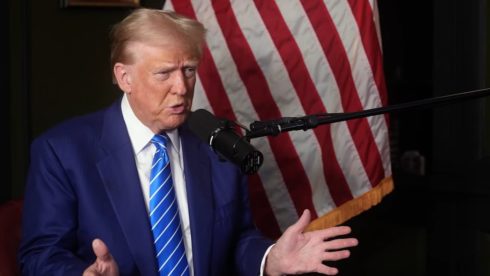Former U.S. President Donald Trump clashed with Bloomberg Editor-in-Chief John Micklethwait during a heated interview at The Economic Club of Chicago on October 15, 2024. The interview focused on Trump’s controversial plans to impose high tariffs on foreign companies, sparking a tense back-and-forth between the two men.
Micklethwait questioned Donald Trump on the potential economic consequences of such a policy, particularly its impact on American consumers. Trump, unfazed, fired back, asserting that Micklethwait had been “wrong” on tariffs his entire life. Trump’s response was indicative of his confidence in the long-term benefits of high tariffs, despite the editor’s concerns about an impending trade war with countries like China and the European Union.
The Debate Over Economic Blowback
Micklethwait repeatedly pressed Donald Trump on how he would avoid an economic blowback for American consumers, given the U.S.’s deep economic ties with global powers like China and the EU. “The overall effect could be massive,” the Bloomberg editor argued, suggesting that Trump’s proposed tariffs could hurt consumers by raising the cost of imported goods. He likened the tariffs to a “national sales tax,” suggesting that the average American would bear the brunt of the policy.
Donald Trump, however, dismissed these concerns, confidently asserting that the tariffs would have a “massive positive effect” on the U.S. economy. He argued that high tariffs would pressure foreign companies to set up operations in the U.S., thereby boosting domestic manufacturing. “The higher the tariff, the more likely it is that the company will come into the United States and build a factory,” Trump claimed, presenting his strategy as a way to bring jobs back to American soil.
Donald Trump’s Counter to Criticisms on Debt and Economic Growth
The exchange also touched on Trump’s broader economic policies, with Micklethwait highlighting concerns about Trump’s plans to eliminate taxes on tips, Social Security, and overtime. Critics, the editor said, fear these policies would significantly increase the national debt. Micklethwait noted that many other publications have echoed these concerns, with Trump facing widespread criticism for “running up an enormous debt.”
In typical fashion, Trump shot back, accusing the media of being consistently wrong about his economic policies. “They’ve been wrong about everything. So have you,” Trump said, turning the conversation into a direct challenge to Micklethwait’s understanding of economic principles. Trump dismissed the criticisms, insisting that his policies would stimulate growth rather than increase debt, and emphasized that Micklethwait had been wrong his entire career on these issues.
Donald Trump’s Vision for U.S. Manufacturing and Trade Policy
Donald Trump’s tariff policy is central to his broader vision for revitalizing U.S. manufacturing. He has promised that if re-elected, he will impose punitive tariffs on foreign companies to incentivize them to move their operations to the U.S. During a September speech in Georgia, Trump outlined plans to offer tax incentives, including a 15% corporate tax rate, and access to federal land and infrastructure, but only for companies that employ American workers.
In an especially striking moment, Trump warned that foreign companies like the machinery manufacturer John Deere could face up to 200% tariffs if they move abroad. He also threatened to impose a 100% tariff on any car crossing the U.S.-Mexico border. “Foreign nations will be worried about losing their jobs to America,” Trump declared, underscoring his belief that these aggressive trade measures would strengthen the American economy by attracting foreign investments and jobs.
Clashes Over January 6th and Peaceful Transfer of Power
The conversation took an even more contentious turn when Micklethwait raised the issue of the January 6th Capitol riots. Micklethwait suggested it was “by far the worst transfer of power for a long time.” Trump pushed back against the characterization, asserting that he had peacefully left office as required. “I left the morning that I was supposed to leave. I went to Florida, and you had a very peaceful transfer,” Trump said, before implying that law enforcement played a role in allowing rioters into the Capitol. “A lot of strange things happened there…with people being waved into the Capitol by police,” he added.
The discussion showcased Trump’s continued defense of his presidency and his handling of the 2020 election’s aftermath. He also took the opportunity to criticize the media, receiving applause when he referred to the press as “corrupt.” Despite the heated exchanges, Trump remained steadfast in defending his record and future plans, signaling that tariffs and his economic vision will remain central themes in his 2024 presidential campaign.














